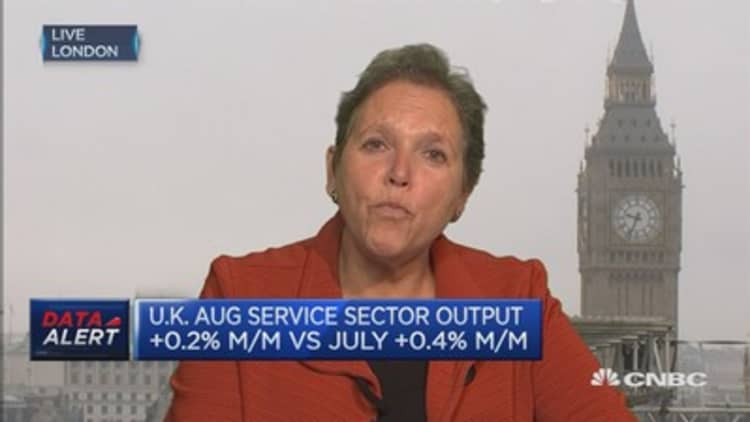
The British economy surprised Thursday with a better-than-expected set of growth figures for the third quarter – the first set of figures that measured the impact of the U.K.'s Brexit vote.
The U.K.'s gross domestic product (GDP) rose at 0.5 percent quarter-on-quarter in the three months to September. This was above a consensus forecast of 0.3 percent.
The yearly rate also beat expectations growing at 2.3 percent compared to a consensus estimate of 2.1 percent.
Phillip Hammond, the U.K. finance minister, said Thursday's figures proved that the fundamentals of the U.K. economy were strong. Sterling strengthened against the euro increasing by 0.13 percent following the data release.
"The number came better than expected. But manufacturing and industrial sector have performed badly and this is what we want to emphasize," Naeem Aslam, chief market analyst at Think Markets said in a note.

Mining and oil industries were the strongest contributions to Thursday's figures against weaknesses in the manufacturing and construction sectors.
"It is certainly too early to call that Brexit effects are over or they will not have an impact on the UK's growth," Aslam added.
"I hope we weather the storm well. The underlying concerns remain there. The inflationary impact in the drop of the pound is not coming through," Baroness Susan Kramer PC, the treasury spokesperson for the Liberal Democrats told CNBC on Thursday.
Observers have been quick to recognise the positive news, but have kept their concerns over the economic impact that the Brexit vote will have in the medium to long term.
"It could be that the economy is in a post-referendum "sweet spot" whereby some of the positive developments since the vote, such as action by the MPC have been felt before the major adverse consequences, such as a rise in inflation,"Ruth Gregory, U.K. economist at capital earnings said in an email.
The Bank of England raised last month its growth expectations citing that near-term economic activity had been stronger-than-expected. The bank is holding a monetary policy meeting next Monday.
"Forget any idea about a rate cut next week, and think about Forbes saying QE should be stopped immediately," Marc Ostwald, strategist at ADM Investor Services International said in an email.


